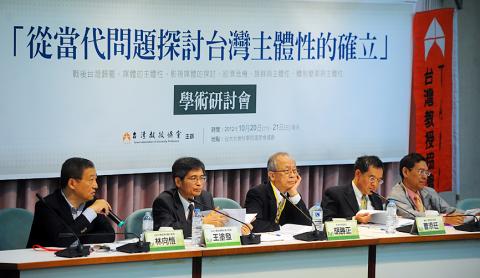Government efforts launched last month to stimulate the economy lack any clear results and GDP might still contract or grow at a rate of less than 1 percent, economists said yesterday.
National Taiwan University economics professor Kenneth Lin (林向愷) said he did not believe President Ma Ying-jeou (馬英九) could make good on his promise to make economic progress within the month — which would be up on Wednesday — despite a rise in exports last month and a lowering of the unemployment rate.
The rise in exports last month was primarily due to the Chinese need for petrochemical and information-technology products, and it also shows that Taiwan’s export products are prone to fluctuation.

Photo: Wang Min-wei, Taipei Times
Pointing to the Ma administration’s promise to “feel improvements in the economy” last month, Lin said he did not see how the people “felt” anything except the continued increase in unpaid leave, short-term and irregular workers, and the continued stagnation of Taiwan’s average wages.
Lin said there were still more than 3 million people with monthly wages below NT$30,000 (US$1,000), adding: “I’m sure if someone made a poll on whether economy had improved, they would say: ‘What improvements?’”
National Taipei University economics professor Wang To-far (王塗發) also said Taiwan saw a 4 percent decrease in its exports this year, totaling NT$220 billion between January and last month.
There’s no way anybody would “feel” an upturn with those kind of figures, Wang said, adding that the nation’s GDP also did not do well in the first quarter, and contracted in the second quarter.
There have not been any constructive economic policies in the past month aside from the “complicated and nigh incomprehensible Economic Power-up Plan,” Wang said.
Commenting on the government’s trumpeting of a rise in exports last month, Wang said rise was seasonal, because the month usually saw high exports in the run-up to Christmas.
The rise in exports did not necessarily point to an increase in Taiwan’s total GDP for the year, Wang said, adding that this year’s GDP would likely “be below 1 percent.”
Wang also said that the Ma administration “didn’t understand economics,” saying that it was impossible to perceive economic problems within a month, much less fix them.
Meanwhile, in a seminar hosted by the Taiwan Association of University Professors (TAUP), attending economists all warned that the “Ma administration’s economic opening-up policy was a mistake.”
Lin said that Taiwan had no lack of talent and funding, but despite that, the Ma administration insisted on introducing Chinese talent and investment in Taiwan on a large scale.
Lin said that was an attempt by the administration to use “ally with China to rule Taiwan” methods when the nation was beset with problems, tying Taiwan and China closer together.
Wang also said Taiwan’s know-how was migrating into China at a rapid speed because more than 70 percent of Taiwanese investments were concentrated in countries with less sophisticated methods and technology.
This has turned Taiwan-China relations from mutual aid into competition, Wang said, adding that Taiwan should lessen its trade dependency on China and strive to keep ahead in the technology sector.

Alain Robert, known as the "French Spider-Man," praised Alex Honnold as exceptionally well-prepared after the US climber completed a free solo ascent of Taipei 101 yesterday. Robert said Honnold's ascent of the 508m-tall skyscraper in just more than one-and-a-half hours without using safety ropes or equipment was a remarkable achievement. "This is my life," he said in an interview conducted in French, adding that he liked the feeling of being "on the edge of danger." The 63-year-old Frenchman climbed Taipei 101 using ropes in December 2004, taking about four hours to reach the top. On a one-to-10 scale of difficulty, Robert said Taipei 101

Nipah virus infection is to be officially listed as a category 5 notifiable infectious disease in Taiwan in March, while clinical treatment guidelines are being formulated, the Centers for Disease Control (CDC) said yesterday. With Nipah infections being reported in other countries and considering its relatively high fatality rate, the centers on Jan. 16 announced that it would be listed as a notifiable infectious disease to bolster the nation’s systematic early warning system and increase public awareness, the CDC said. Bangladesh reported four fatal cases last year in separate districts, with three linked to raw date palm sap consumption, CDC Epidemic Intelligence

US climber Alex Honnold left Taiwan this morning a day after completing a free-solo ascent of Taipei 101, a feat that drew cheers from onlookers and gained widespread international attention. Honnold yesterday scaled the 101-story skyscraper without a rope or safety harness. The climb — the highest urban free-solo ascent ever attempted — took just more than 90 minutes and was streamed live on Netflix. It was covered by major international news outlets including CNN, the New York Times, the Guardian and the Wall Street Journal. As Honnold prepared to leave Taiwan today, he attracted a crowd when he and his wife, Sanni,

Taiwanese and US defense groups are collaborating to introduce deployable, semi-autonomous manufacturing systems for drones and components in a boost to the nation’s supply chain resilience. Taiwan’s G-Tech Optroelectronics Corp subsidiary GTOC and the US’ Aerkomm Inc on Friday announced an agreement with fellow US-based Firestorm Lab to adopt the latter’s xCell, a technology featuring 3D printers fitted in 6.1m container units. The systems enable aerial platforms and parts to be produced in high volumes from dispersed nodes capable of rapid redeployment, to minimize the risk of enemy strikes and to meet field requirements, they said. Firestorm chief technology officer Ian Muceus said